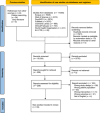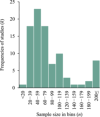Psychological treatments for mental health symptoms associated with COVID-19 infection: A scoping review
- PMID: 38962000
- PMCID: PMC11216928
- DOI: 10.1002/pcn5.223
Psychological treatments for mental health symptoms associated with COVID-19 infection: A scoping review
Abstract
The aim of this scoping review was to synthesize published studies and ongoing clinical trials of psychological interventions for mental health problems associated with COVID-19 infection. The study protocol was developed according to the Preferred Reporting Items for Systematic Reviews and Meta-Analyses (PRISMA) Extension for Scoping Reviews. We conducted systematic searches for studies published or registered between January 2020 and October 2022 using eight scientific databases and clinical trial registries, which identified 40 complete published studies and 53 ongoing clinical trials. We found that most studies were randomized controlled trials (74%) while the remaining used study designs of lower methodological quality. Most studies investigated interventions for acute COVID-19 patients (74%) and others explored post-COVID conditions (PCC) or recovered patients. Cognitive and behavioral therapies were the main intervention approaches (31%), followed by multidisciplinary programs (21%) and mindfulness (17%). The most frequently evaluated outcomes were anxiety (33%), depression (26%), quality of life (13%), and insomnia (10%). No studies on youths, older people, or marginalized communities were found. These findings summarize the burgeoning research on a range of psychological interventions for individuals infected with COVID-19. However, the field is in its infancy and further research to develop an evidence base for targeted care is necessary. The gaps identified in the current study also highlight the need for more research on youths, older people, and members of marginalized communities, and PCC patients. It is important to ascertain interventions and delivery strategies that are not only effective and affordable but also allow high scalability and accessibility.
Keywords: COVID‐19; anxiety; depression; psychotherapy; sleep initiation and maintenance disorders.
© 2024 The Author(s). Psychiatry and Clinical Neurosciences Reports published by John Wiley & Sons Australia, Ltd on behalf of Japanese Society of Psychiatry and Neurology.
Conflict of interest statement
Masaya Ito has received royalties for books and writings on psychological treatment from Shindan to Chiryo sha, Sogen sha, and several publishing companies in Japan. He has also received honorariums for workshops and supervision related to psychological treatments. Hironori Kuga is an Editorial Board member of Psychiatry and Clinical Neurosciences Reports and a co‐author of this article. To minimize bias, they were excluded from all editorial decision‐making related to the acceptance of this article for publication.
Figures



Similar articles
-
Psychological treatments for the mental health symptoms among individuals infected with COVID-19: a scoping review protocol.BMJ Open. 2023 Mar 2;13(3):e069386. doi: 10.1136/bmjopen-2022-069386. BMJ Open. 2023. PMID: 36863745 Free PMC article.
-
The future of Cochrane Neonatal.Early Hum Dev. 2020 Nov;150:105191. doi: 10.1016/j.earlhumdev.2020.105191. Epub 2020 Sep 12. Early Hum Dev. 2020. PMID: 33036834
-
Mobile apps to reduce depressive symptoms and alcohol use in youth: A systematic review and meta-analysis: A systematic review.Campbell Syst Rev. 2024 Apr 26;20(2):e1398. doi: 10.1002/cl2.1398. eCollection 2024 Jun. Campbell Syst Rev. 2024. PMID: 38680950 Free PMC article. Review.
-
Behavioural modification interventions for medically unexplained symptoms in primary care: systematic reviews and economic evaluation.Health Technol Assess. 2020 Sep;24(46):1-490. doi: 10.3310/hta24460. Health Technol Assess. 2020. PMID: 32975190 Free PMC article.
-
Interventions for adults with a history of complex traumatic events: the INCiTE mixed-methods systematic review.Health Technol Assess. 2020 Sep;24(43):1-312. doi: 10.3310/hta24430. Health Technol Assess. 2020. PMID: 32924926 Free PMC article.
References
Publication types
LinkOut - more resources
Full Text Sources
